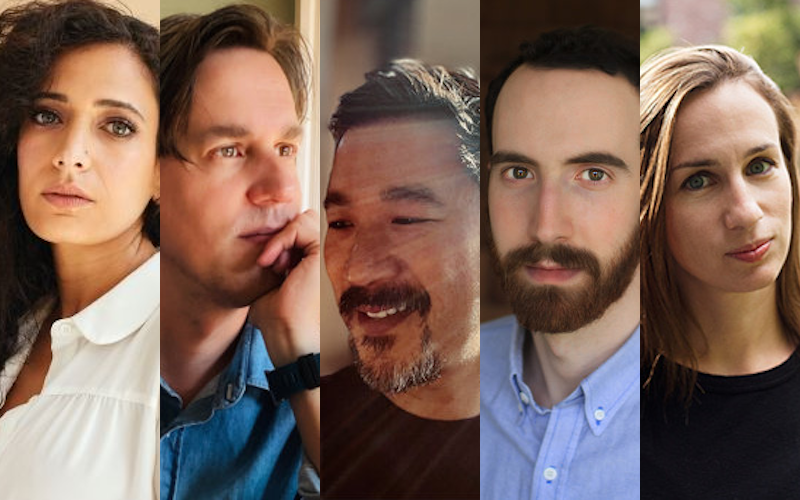
Lit Hub Asks: 5 Authors, 7 Questions, No Wrong Answers
Featuring Hala Alyan, Nam Le, Adelle Waldman and More
The Lit Hub Author Questionnaire is a monthly interview featuring seven questions for five authors with new books. This month we talk to:
*
Hala Alyan (The Moon That Turns You Back)
Steven Kurutz (American Flannel: How a Band of Entrepreneurs Are Bringing the Art and Business of Making Clothes Back Home)
Nam Le (36 Ways of Writing a Vietnamese Poem)
Jacob Rubin (Piggy Bank)
Adelle Waldman (Help Wanted)
*
Without summarizing it in any way, what would you say your book is about?
Adelle Waldman: Work.
Hala Alyan: Longing. Beirut. Codependency. February. IVF clinics. Lucid dreaming. Palestine. Pregnancy tests. Daughtering.
Jacob Rubin: Trying to connect with people who are gone and / or can’t hear you.
Nam Le: I reckon the title about almost covers it.
Steven Kurutz: American makers. Resilience. The tragedy of deindustrialization. Survivors. Hope. A well-worn flannel shirt. Asking who we want to be as a country—consumers and marketers, or makers?
*
Without explaining why and without naming other authors or books, can you discuss the various influences on your book?
Hala Alyan: Archives. Maps. The first few weeks of a new season. Carving a heart on a rubber stamp next to two initials. Sonogram heartbeats. Anesthesia. Walks through Cooper Park. Calling a friend breathlessly. Finding the water at the end of a humid night. Rhyme schemes.
Steven Kurutz: A vintage Carhartt jacket found in a resale shop. My childhood in the rust belt. Family road trips to Woolrich, Pennsylvania. Picanol high-speed looms and ANGE sock knitting machines at furious work. American style especially the holy trinity of jeans, white tees and flannels.
Nam Le: Red, general; green, food & garden organics; purple, glass; yellow, mixed recycling. PET code 1 bottles, yes; food containers, jars, berry punnets, no; HDPE code 2 detergent, milk & juice bottles, yes; grocery bags, no; PP code 5 ice-cream, butter & yoghurt containers, yes; PVC code 3, LDPE code 4, PS code 6 and PC code 7, no, no are you dense?, no.
Adelle Waldman: Boxes, trucks, The Office, Succession.
Jacob Rubin: White Rock Lake; certain beloved walks I take by my house in Dallas; the pandemic.
*
Without using complete sentences, can you describe what was going on in your life as you wrote this book?
Nam Le: Lockdown. And not the Duolingo / Zoom-drinks / sour-doughy one.
Adelle Waldman: Caring for a small child.
Hala Alyan: Cutting my own bangs. Waiting for HCG levels. Googling fetal heartbeats. Crying in green paper gowns. Waiting for him to pick up. Covid.
Jacob Rubin: Coffee, memory, and ESPN.
Steven Kurutz: New fatherhood. Covid. The death of a family member. Fatherhood, again. Too much time procrastinating on online auction sites. A big, jolting move out of the city.
*
What are some words you despise that have been used to describe your writing by readers and/or reviewers?
Steven Kurutz: I work for The New York Times. The critiques I receive from readers are too varied and specific to neatly summarize.
Hala Alyan: “Human.”
Nam Le: A domestic scene from this morning comes to mind. My daughter puts my huge headphones over her ears, says, “Try and talk to me to see if I can hear.” I say nothing, do nothing, just watch her. Daughter: “What? What?! What??!”
Adelle Waldman: Pretentious. Confusing.
Jacob Rubin: “Zany.”
*
If you could choose a career besides writing (irrespective of schooling requirements and/or talent) what would it be?
Jacob Rubin: Defensive end.
Nam Le: Maybe a music producer? Maybe a music producer in, like, Tuscany?
Adelle Waldman: English teacher.
Hala Alyan: Visual artist. And/or photographer.
Steven Kurutz: Woodworker, sculptor, landscape architect, classic car restorer—some job where I’m molding physical objects rather than words.
*
What craft elements do you think are your strong suit, and what would you like to be better at?
Nam Le: All of the above.
Jacob Rubin: I think I’m good at narrative structure. I would like to be better at every element of writing.
Steven Kurutz: I have a good instinct for story and characters and an ear for great quotes. I’d like to develop the fiction writer’s talent for sensory detail and description.
Adelle Waldman: I think my strong suit is light irony. I’m terrible at lyricism.
Hala Alyan: I’ve got description and meandering imagery down. Plot is an ongoing wrestling match.
*
How do you contend with the hubris of thinking anyone has or should have any interest in what you have to say about anything?
Steven Kurutz: As a journalist I mostly tell other people’s stories, which cuts down on the self-indulgence. And I try to shine a light on deserving people who for one reason or other haven’t received their due, which gives me a sense of mission.
Jacob Rubin: I don’t think it’s hubristic for a person to feel they have something to say.
Nam Le: What? What?! People are interested?!
Hala Alyan: I genuinely don’t. I trust people to make decisions on engaging (or not) with my work.
Adelle Waldman: By feeling disgusted with myself much of the time.
Teddy Wayne
Teddy Wayne, the author of Apartment, Loner, The Love Song of Jonny Valentine, and Kapitoil, is the winner of a Whiting Writers’ Award and an NEA Fellowship as well as a finalist for the Young Lions Fiction Award, PEN/Bingham Prize, and Dayton Literary Peace Prize. He writes regularly for The New Yorker, The New York Times, Vanity Fair, McSweeney’s, and elsewhere. He lives in New York.



















